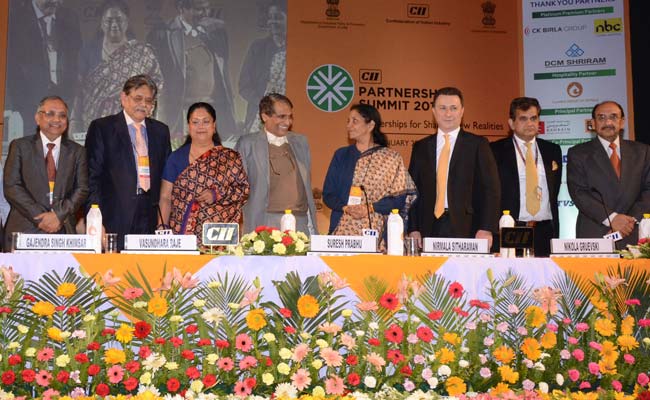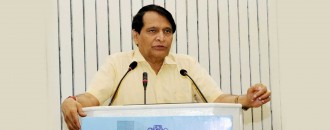
India must prepare for a higher regulatory regime in foreign trade: Rajeev Kher
Naveen Kumar | The Dollar Business  Rajeev Kher, Commerce Secretary, Government of India, has said that the world of foreign trade is moving towards a higher regulatory regime as mega-regionals such as the Trans-Pacific Partnership (TTP) and Trans-Atlantic Trade and Investment Partnership (TTIP) looked to set a new rules paradigm. Kher was speaking on the second day of the 21st edition of Partnership Summit in Jaipur summit organised by the Confederation of Indian Industry (CII) in Jaipur, Rajasthan, India from January 15-17, 2015. The summit was first held in 1995 and has now become CII’s flagship international event. The theme for this year’s summit was “Partnerships for Shared New Realities” and it was organised with an aim to provide an engaging platform to discuss and share knowledge about best strategies for both developed and developing economies to encourage and build new bridges which foster balanced and equitable growth, said CII. Speaking at the inaugural session of the summit Suresh Prabhu, Union Railway Minister, stated that the true potential of India could only be realised once the country had a unified market with the implementation of the Goods and Services Tax (GST) in the country. Inviting businesses to partner in Rajasthan’s progress, Vasundhara Raje, Chief Minister, Rajasthan, said that the state government has announced a slew of reforms, particularly in the labour front, to help businesses. Among foreign participants, Nikola Gruevski, Prime Minister, Macedonia, highlighting some of the advantages of investing in Macedonia, said that his country had one of the lowest tax rates in the world. Andrew Robb, Minister of Trade and Investment, Australia, said that when TPP and RCEP regions come together the benefits of seamless regulations can be shared across the whole region. Harsha Vardhana Singh, former DDG of the WTO, said that mega-regionals are an indication of the change that is taking place in the world and the upgradation taking place much faster than expected. Later, Gao Yan, Vice-Minister of Commerce, China, said that while China is getting used to the “new normal” of lower growth and higher reforms, standards are being constantly upgraded to reflect innovation driven growth. “China attaches great importance to the TPP and TTIP negotiations and is open towards joining both mega-regionals,” she said. Both China and India are part of the RCEP, one of the most important regional agreements in Asia, and China looks to work constructively with India towards conclusion of the agreement, she said. Meanwhile, Roberto Azevêdo, Director General, World Trade Organisation (WTO), said that the Bali Package will deliver on the development front by enhancing developing countries’ ability to integrate into the world economy. On the trade facilitation agreement (TFA), he noted that the benefits will be visible to Indian industry as competitiveness and exports will receive a boost once members ratify the agreement. The TFA will bring down trade costs by 15% and bolster south-south trade, he said. Talking on regional co-operation, in his address, Wencai Zhang, Vice-President, Asian Development Bank (ADB), Philippines, said, “South Asia has been growing at 6% annually since 1990s and can even grow faster if more integrated as it can reduce trade cost and improve efficiency.” Giving his perspectives on the issue, Shishir Priyadarshi, Director, World Trade Organisation (WTO) said, “A win-win situation for all can be attained from deepening regional collaborations. If member countries do not act promptly, mega-regional deals like the EU-US, TPP etc. can become more challenging. Speaking during the panel discussion on “India and US to witness deeper collaborations and partnerships” Ambassador Frank Wisner, Former US Ambassador to India, and Patton Boggs, International Affairs Advisor, said that defence production and trade was a potential area of cooperation for the two countries. Wisner said that India’s position in trade alliances like the Trans Pacific Partnership (TPP), the Asia-Pacific Economic Cooperation (APEC) and the Pacific Alliance (PA) would also help in forging Indo-US ties. He also emphasised that US President Obama’s upcoming visit will be one of the defining moments in Indo-US bilateral relations both politically and economically. Speaking on India’s FDI regime Amitabh Kant, Secretary, Department of Industrial Policy and Promotion, Ministry of Commerce and Industry, Government of India, highlighted that India was one of the most liberal countries in terms of its FDI regime as over 90% of the proposals fell under the automatic route. Krish Iyer, President and CEO, Walmart India, pointed out that for facilitating an enabling economic environment for investors, the role of States and their relationship with the Centre is significant. He added that it is heartening to see the initiatives of the current government like new de-licencing and deregulation measures to create a win-win situation for both India and USA. Talking on India’s manufacturing aspiration, Patricia Hewitt, Chair, UK-India Business Council stated that UK companies are already manufacturing in India – some for several years now. She added that UK is keen to extend support to India in areas such as smart cities, rejuvenation of older cities, and embedded services in manufacturing. In his address, Martin Hamilton-Smith, Minister for Investment and Trade, Government of South Australia, stated that his state was ready to support the “Make in India” campaign as South Australia was a major centre for high value added manufacturing such as robotics and industrial automation which could help make manufacturing processes more efficient. William Danvers, Deputy Secretary General, Organisation for Economic Cooperation and Development (OECD) and Li Yong, Director General, United Nations Industrial Development Organisation (UNIDO) both highlighted the need for India to address issues such as infrastructure and regulatory bottlenecks to attract greater investment into the manufacturing sector.
Rajeev Kher, Commerce Secretary, Government of India, has said that the world of foreign trade is moving towards a higher regulatory regime as mega-regionals such as the Trans-Pacific Partnership (TTP) and Trans-Atlantic Trade and Investment Partnership (TTIP) looked to set a new rules paradigm. Kher was speaking on the second day of the 21st edition of Partnership Summit in Jaipur summit organised by the Confederation of Indian Industry (CII) in Jaipur, Rajasthan, India from January 15-17, 2015. The summit was first held in 1995 and has now become CII’s flagship international event. The theme for this year’s summit was “Partnerships for Shared New Realities” and it was organised with an aim to provide an engaging platform to discuss and share knowledge about best strategies for both developed and developing economies to encourage and build new bridges which foster balanced and equitable growth, said CII. Speaking at the inaugural session of the summit Suresh Prabhu, Union Railway Minister, stated that the true potential of India could only be realised once the country had a unified market with the implementation of the Goods and Services Tax (GST) in the country. Inviting businesses to partner in Rajasthan’s progress, Vasundhara Raje, Chief Minister, Rajasthan, said that the state government has announced a slew of reforms, particularly in the labour front, to help businesses. Among foreign participants, Nikola Gruevski, Prime Minister, Macedonia, highlighting some of the advantages of investing in Macedonia, said that his country had one of the lowest tax rates in the world. Andrew Robb, Minister of Trade and Investment, Australia, said that when TPP and RCEP regions come together the benefits of seamless regulations can be shared across the whole region. Harsha Vardhana Singh, former DDG of the WTO, said that mega-regionals are an indication of the change that is taking place in the world and the upgradation taking place much faster than expected. Later, Gao Yan, Vice-Minister of Commerce, China, said that while China is getting used to the “new normal” of lower growth and higher reforms, standards are being constantly upgraded to reflect innovation driven growth. “China attaches great importance to the TPP and TTIP negotiations and is open towards joining both mega-regionals,” she said. Both China and India are part of the RCEP, one of the most important regional agreements in Asia, and China looks to work constructively with India towards conclusion of the agreement, she said. Meanwhile, Roberto Azevêdo, Director General, World Trade Organisation (WTO), said that the Bali Package will deliver on the development front by enhancing developing countries’ ability to integrate into the world economy. On the trade facilitation agreement (TFA), he noted that the benefits will be visible to Indian industry as competitiveness and exports will receive a boost once members ratify the agreement. The TFA will bring down trade costs by 15% and bolster south-south trade, he said. Talking on regional co-operation, in his address, Wencai Zhang, Vice-President, Asian Development Bank (ADB), Philippines, said, “South Asia has been growing at 6% annually since 1990s and can even grow faster if more integrated as it can reduce trade cost and improve efficiency.” Giving his perspectives on the issue, Shishir Priyadarshi, Director, World Trade Organisation (WTO) said, “A win-win situation for all can be attained from deepening regional collaborations. If member countries do not act promptly, mega-regional deals like the EU-US, TPP etc. can become more challenging. Speaking during the panel discussion on “India and US to witness deeper collaborations and partnerships” Ambassador Frank Wisner, Former US Ambassador to India, and Patton Boggs, International Affairs Advisor, said that defence production and trade was a potential area of cooperation for the two countries. Wisner said that India’s position in trade alliances like the Trans Pacific Partnership (TPP), the Asia-Pacific Economic Cooperation (APEC) and the Pacific Alliance (PA) would also help in forging Indo-US ties. He also emphasised that US President Obama’s upcoming visit will be one of the defining moments in Indo-US bilateral relations both politically and economically. Speaking on India’s FDI regime Amitabh Kant, Secretary, Department of Industrial Policy and Promotion, Ministry of Commerce and Industry, Government of India, highlighted that India was one of the most liberal countries in terms of its FDI regime as over 90% of the proposals fell under the automatic route. Krish Iyer, President and CEO, Walmart India, pointed out that for facilitating an enabling economic environment for investors, the role of States and their relationship with the Centre is significant. He added that it is heartening to see the initiatives of the current government like new de-licencing and deregulation measures to create a win-win situation for both India and USA. Talking on India’s manufacturing aspiration, Patricia Hewitt, Chair, UK-India Business Council stated that UK companies are already manufacturing in India – some for several years now. She added that UK is keen to extend support to India in areas such as smart cities, rejuvenation of older cities, and embedded services in manufacturing. In his address, Martin Hamilton-Smith, Minister for Investment and Trade, Government of South Australia, stated that his state was ready to support the “Make in India” campaign as South Australia was a major centre for high value added manufacturing such as robotics and industrial automation which could help make manufacturing processes more efficient. William Danvers, Deputy Secretary General, Organisation for Economic Cooperation and Development (OECD) and Li Yong, Director General, United Nations Industrial Development Organisation (UNIDO) both highlighted the need for India to address issues such as infrastructure and regulatory bottlenecks to attract greater investment into the manufacturing sector.
This article was published on January 17, 2015.





 to success.
to success.